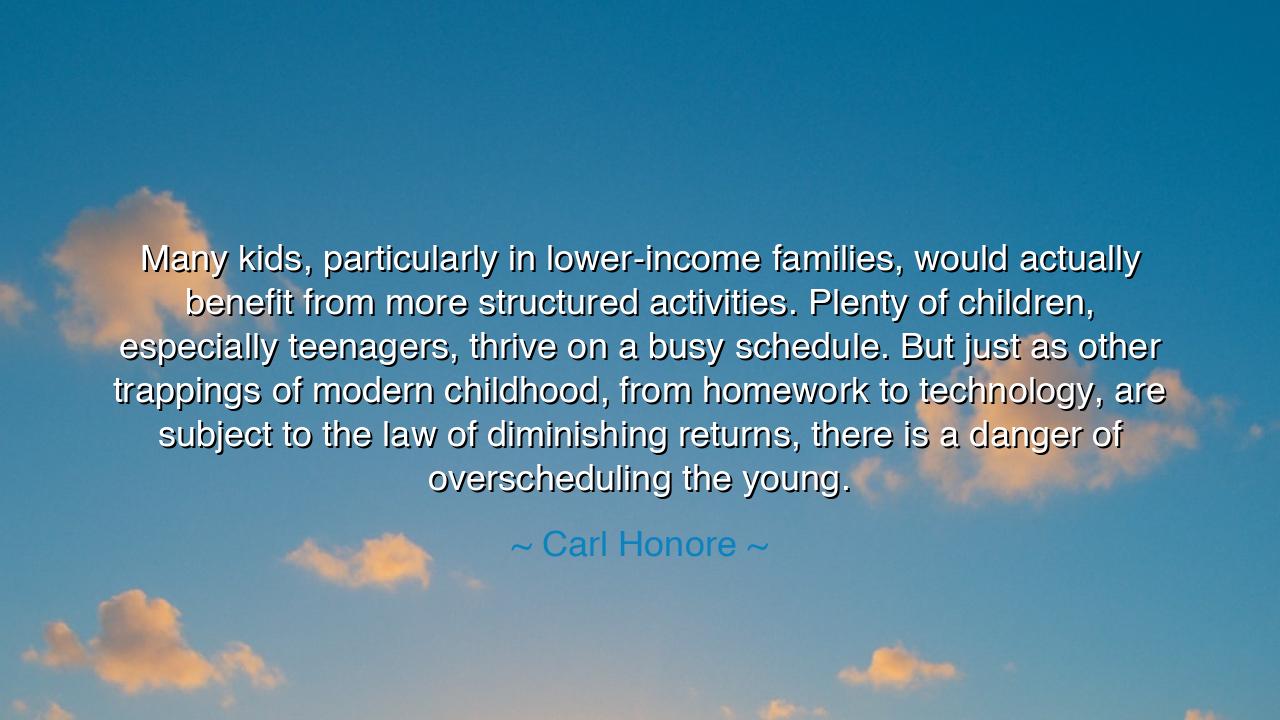
Many kids, particularly in lower-income families, would actually
Many kids, particularly in lower-income families, would actually benefit from more structured activities. Plenty of children, especially teenagers, thrive on a busy schedule. But just as other trappings of modern childhood, from homework to technology, are subject to the law of diminishing returns, there is a danger of overscheduling the young.






Hear, O guardians of the young, the words of Carl Honore, who declared: “Many kids, particularly in lower-income families, would actually benefit from more structured activities. Plenty of children, especially teenagers, thrive on a busy schedule. But just as other trappings of modern childhood, from homework to technology, are subject to the law of diminishing returns, there is a danger of overscheduling the young.” In this wisdom is revealed both promise and peril: that structure can be a ladder, but excess can turn the ladder into chains.
The origin of this truth lies in the nature of youth itself. Children are like rivers—if left entirely untamed, they may flood or wander astray; yet if dammed and diverted too tightly, they may lose their strength and flow into nothingness. For those in lower-income families, structure is not a luxury but a necessity, a path that provides safety, learning, and discipline amidst hardship. Yet Honore warns that even good things, when given without balance, can lead to harm. The rhythm of life must be guided, but never strangled.
Consider, O listeners, the example of Sparta and Athens. The Spartan child was raised under strict order, with every hour shaped toward discipline, combat, and endurance. They became warriors of immense power, but at the cost of poetry, freedom, and joy. In contrast, the Athenian child was guided by both structure and leisure—trained in letters and athletics, but also given room to play, to wander, to question. It was in Athens that philosophy, drama, and democracy were born. This story shows us Honore’s wisdom: order brings strength, but without balance, it suffocates the soul.
Honore invokes the law of diminishing returns, a truth known to the ancients as well: that excess of even a good thing weakens its power. A little homework sharpens the mind, but too much dulls curiosity. A measure of technology connects and informs, but in excess it isolates and distracts. So too with schedules: the busy child may flourish in discipline, but the child without rest, without freedom, loses spirit and becomes weary long before their time.
The deeper meaning is this: youth is a season not only of training but of discovery. The young need structure to learn resilience, but they also need freedom to imagine. They need guidance to walk the path, but also unmeasured time to see what paths might be made anew. To overschedule is to steal from them the joy of wonder, the chance to stumble into creativity, the silence in which dreams are born.
The lesson, then, is clear: be wise in the measure you give. For parents and teachers, let the child’s day be ordered, but not consumed. Let there be activities that build skill and discipline, but also spaces of emptiness where the young may dream, explore, and even be bored—for in boredom, imagination often awakens. The balance between order and freedom is the true gift that nurtures a whole life.
Practical actions flow from this wisdom. Enroll children in structured activities that fit their passions, but leave time in their days unscripted. Limit homework and technology not to deny them, but to preserve their joy. Watch carefully for signs of exhaustion, and adjust with patience. And above all, remember that the goal is not to raise perfect machines of productivity, but whole human beings, whose minds are sharp, whose hearts are joyful, and whose spirits are free.
Thus do we honor the words of Carl Honore: that structure can uplift, but overscheduling can crush; that children thrive on balance, not extremes. Carry this teaching, O children of tomorrow’s parents and guides. For when you honor both the order and the freedom of youth, you raise not only workers or scholars, but full souls ready to shape the world with strength and wonder.






AAdministratorAdministrator
Welcome, honored guests. Please leave a comment, we will respond soon